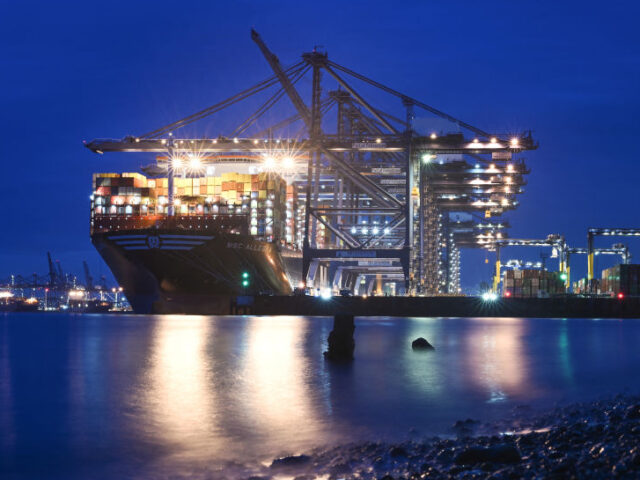Shipowners determined to make a bid for a return to normalcy in global trade without running the risk of becoming a victim of Iran-backed rebels in the Red Sea are asking for clearance to embark armed security teams.
The great flow of trade carrying merchandise and energy from the Gulf and East to Europe and the U.S. Eastern seaboard has been disrupted for months following repeated attacks by Iran-backed, Shiite Islamist Houthi militias attacking cargo ships transiting the Red Sea. While hundreds of voyages have been impacted, with many ships being forced to divert around the Horn of Africa, adding weeks and millions of dollars in extra costs per voyage, some shipping companies are looking at how soon they can return to using the Red Sea shortcut.
A group of Dutch shipowners have approached the Ministry of Defence in Amsterdam to get permission to embark armed teams onboard cargo ships flying the national flag. While the mercenaries would be of little use in the case of a missile attack — of which there have been many since the Houthis started launching strikes on global trade in sympathy with their allies in Gaza — the ship owners want them in case of pirate attacks by the terror group.
That boarding raids are part of the Houthis’ modus operandi was dramatically illustrated at the end of last year when large car carrier the Galaxy Leader was taken by their commandos. The ship, her crew, and its valuable cargo remains in the possession of the Houthis, with the group even allowing curious members of the public to go aboard to enjoy the new “tourist attraction”.
Acting on the assumption that the group of navies working to defend merchant ships from Houthi missiles and drones would soon succeed in the combination of shootdowns and strikes against launch sites in Yemen, the Royal Association of Dutch Shipowners sought to get teams to defend their ships against attacks on their ships by boatloads of fighters, Dutch broadcaster Nederlandse Omroep Stichting (NOS) reports.
A spokesman for the group told NOS that: “We really want to be able to sail competitively, but not at all costs… The safety of our ships, but especially our crews, is always our top priority. Speaking of an “umbrella” of protection against missiles and drones provided by forces like the U.S. Navy, Britain’s Royal Navy, and the Indian Navy, she continued: “When the umbrella over the Red Sea area with which missiles are removed from the sky is further strengthened, we want to be able to sail there at the same time as our competitors with security on board.”
The embarkation of armed teams is redolent of the response by many ship owners to the Somali Pirate attack crisis earlier this century, when large numbers of ships transiting the Gulf of Aden were attacked by gangs using fast boats, commonly armed with ex-Soviet stock weapons like the AK-47 platform and rocket-propelled grenades. The United Nations’ International Maritime Organisation issued new guidance on Private Armed Security over the Somali piracy attacks, noting “The carriage of firearms on board merchant ships is a complex legal issue”.
The document stated the position had evolved in 30 years from a blanket position against firearms against civilian ships in the 1990s to a more nuanced one by 2015 tacitly acknowledging that “deployment of armed security personnel on board ships has become an accepted industry and flag state practice”.
The Dutch government didn’t directly respond to the shipowners’ request in public today, saying only that while missiles and drones are still a threat in the Red Sea, civilian ships should stay away.
The delays and cost increases brought by the closure of the Red Sea threaten serious knock-on effects for Western economies. A Tesla gigafactory was forced to shutter last month due to a shortage of imported components thanks to the Houthis delaying shipments, and the threat of increased costs undermining efforts by Western governments to get inflation under control is a matter of intense discussion.

COMMENTS
Please let us know if you're having issues with commenting.